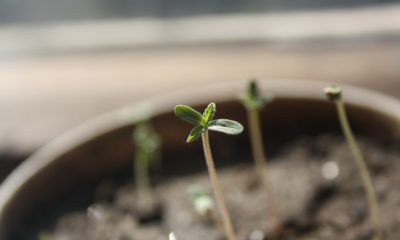
Cultivation
Face of the Farmer: Sol Spirit Farm & Retreats
Meet Walter Wood and Judi Nelson, founders of this earth-conscious cannabis brand that advocates for self-sufficiency and sustainability.
Trinity County sits at the top of the state of California. It’s one of three counties making up the Emerald Triangle, along with Mendocino and Humboldt. Trinity is the more rustic and rural of the counties, with a population of a little less than 13,000 with a sizeable number of craft cannabis farmers up in the hills. Walter Wood and Judi Nelson of Sol Spirit Farm consider themselves Trinity homesteaders. For more than two decades, they’ve been farming off the grid on the same spot on the south fork of the Trinity River, located in the northern part of the Emerald Triangle.
“Homesteading off the grid means doing everything yourself,” Walter says. “It means when the power goes out or the water stops flowing—we deal with it. We aren’t connected to the city water, like some of the larger growers. We make everything happen ourselves by our own hands. That’s really the crux of being a craft cannabis farmer: how hands-on you are in every step of the process.”
Their home is a product of their local environment. The straw bales that comprise the main house were sourced from 120 miles away, the earthen floor was made from the ground beneath and the trees were felled from the property. Homesteading, he said, also means living a righteous and sustainable life, keeping the footprint as small as possible, being mindful of the earth as a precious commodity to be cared for.
He says his personal inspiration for working on the land began when he was very young, growing up in Los Angeles.
“My grandparents gardened one acre in Los Angeles,” he says. “My grandfather was a horticulturist and an etymology hobbyist, with a large bug collection under glass. When they were getting older, I cared for their fruit trees, which included avocados and oranges. It gave me a strong connection to the earth.”
Farming for Health
Walter’s foray into cannabis began in 1992, when he was 20 years old and working for Los Angeles Water & Power. Diagnosed with a permanent back injury, he was initially prescribed, what he refers to as, “heavy duty painkillers.” That’s when he discovered cannabis to be a better choice.
“Just by smoking cannabis it greatly reduced the spasms and pain much better than the pills,” he says. “Without the plant, the pain becomes unmanageable. I never found pharmaceuticals could help me nearly as much as the natural, healthy product I can grow myself.”
His cannabis prescription has been updated for more than two decades under California’s Medical Cannabis program that began in 1996, making the Golden State the first to legalize cannabis for medicine in the country.
The Grateful Dead, Weed & Romance

In 1995, shortly after Jerry Garcia of the Grateful Dead passed, Judi and Walter met at his memorial in LA. After the event Judi wanted to attend a Rainbow gathering down in Mexico and someone asked Walter if he could work on a bus for the group of nine to travel there together.
“We never found the gathering,” Walter says, laughing, “but we had a great time together and smoked a kilo of bud in no time, as we trekked down to Michoacan and back. The entire trip took three and a half months—long enough to get to know each other on a bus in close quarters.”
During the trip, Judi and Walter became a couple and eventually ended up in Baton Rouge where Judi was working as a temporary traveling physical therapist. They immediately noticed a serious lack of cannabis in Louisiana, with Walter educating himself by reading Ed Rosenthal’s 1990 version of the Marijuana Grower’s Handbook.
“There were no grow shops or specific equipment for growing available at that time, so I went to the hardware store and bought two porch lights, one 250 watts, the other 150 watts, then made a homemade hood and I immediately became addicted to growing cannabis.”
After a stint in Arkansas looking for land and another relocation with Judi’s work, they were pulled over with guns drawn and arrested for a dirty pipe, clean glass pipes and glass blowing paraphernalia Walter had been working with—misdemeanors, all. With no scent of cannabis in their 1972 Westfalia hippie van and only the scent of incense burned, with Walter’s dreadlocks down to his waist, the two felt they were definitely profiled in the ultra-conservative state.
Walter pleaded guilty so Judi wouldn’t lose her physical therapist license. In court, the newly graduated officer admitted that he learned incense is used to cover up the smell of cannabis, and he had no evidence as cause for pulling them over in the first place. Consequently, the couple was released with $2,500 in bail and no time served, but Walter did lose his driver’s license for six years.
The experience scared them off the road and helped them make the decision to relocate to the more progressive state of California. They landed initially in Humboldt County in the City of Arcata—otherwise known as ’60s by the Sea—and began growing in a residential neighborhood in an attic space of a 500-square-foot house.
But growing indoors wasn’t sustainable, and soon the Woods would be called into the woods.
Life on the Farm
They hadn’t even looked at the farm they now call home due to rumors of meth use from its tenants and a lack of water on the property.
“We’d been looking for a couple of years and this place had been for sale the entire time,” Walter said. “Without a source of water, we didn’t feel it’d work for us, but after a 200-to-300-foot hike up the hill, we found the end of a pipe, we were hopeful. It wasn’t at a spring, but then we found a hand-dug trench in two or three inches of water. Hand digging trenches on the side of a mountain just isn’t done any more.”
This find told them that back in the 1930s, when it was common to hand dig to a spring, water was there, with the pipes long abandoned. After they purchased the property they received a deed to water rights to the stream that had been dug out long ago.
“Water’s everything,” he said. “We also practice rain water catchment, but we’d have never bought this place without access to a spring.”
Sol Spirit is an organic, sustainable and regenerative farm producing award-winning, sungrown craft cannabis.
“Our intent has always been to source as much of our calories from the farm, living off the land as much as we can,” he says. “Practicing regenerative farming techniques makes all the difference to the quality of flower we produce—and the food we grow for ourselves and our guests.”
According to greenamerica.org, regenerative agricultural practices include using cover crops, reducing tiling, rotating crops, spreading compost and moving away from synthetic fertilizers, pesticides, herbicides and factory farming.”
“We also practice what’s called Intensive Rotational Grazing, with our chickens and pigs, conditioning the soil as they graze,” Walter says.

The farm has won many awards, including from The Emerald Cup, The Grow Off and WeedCon. Important to note, The Emerald Cup has never been awarded to a cannabis farmer for a high THC (tetrahydrocannabinol), but rather for the overall profile of the plant—meaning the complex bouquet, derived from the sun and the rich, loamy soil to the North.
“Earth Conscious Cannabis” is the farm’s slogan, with Walter saying that most of the regulations under the legal market seem out of step with the farming of, and the harmless nature of the plant.
Growing in native soil, Walter says, allows the plant to fully express the terroir that’s made the region famous and the flowers fragrant. Cultivars such as Sol Cookies, Sol Shine, Mother’s Milk and the classic Sour Diesel don’t disappoint.
“Our hope is that the small, craft sungrown farmers’ products are realized for their quality sooner than later, so that we can survive corporatization and commodification of this sacred plant,” he continued. “We can’t compete with big agriculture on prices, and they can’t compete with us on handcrafted quality—that’s a fact.”
In keeping with its environmentally conscious mission, Sol Spirit Farm’s products are all hand packaged using recycled glass containers, with ocean recycled plastic lids and compostable labels, with them winning First Place for the 2022 Emerald Cup for Eco-conscience Packaging.
Glamping to Sustain

Subsidizing the family cannabis farm looks a little different than the average American farmer’s subsidy from the federal government. With no Farm Aid for cannabis farmers, many are getting creative in the way they use their space and the farm.
In an effort to open up to the community at large, while providing a much-needed additional income, the couple started another branch of the business: Sol Spirit Retreats. Judi turned a flat meadow into glamping grounds, offering up overnight stays in well-outfitted bell tents, with real beds and linens. As a plus, each tent has its own private bath nearby with hot running water and fluffy towels.
“All our meals are farm to table,” Judi says. “We use organic eggs, produce and livestock from the farm, and locally sourced goods from other farmers in the area.”
Zucchini noodles, marinara sauce, pesto and salads all come from the garden. Nearby are the iconic Willow Creek peach farmers; Jacque and Amy Neukom’s dry-farmed peaches along the Trinity River are used in cobbler.
“Our favorite is cannabis-infused peach ice cream,” Judi says. “I use our Blueberry Muffin flower (Humboldt Seed Co’s genetics) for the infusion. We don’t grow carrots on the farm, because up the road Willow Creek Farms grows the best carrots you’ll ever taste.”

Breakfast might include locally sourced fruits, bacon from their own sustainably raised (and loved) pigs, and eggs from their own free-range, organically fed chickens. Stays include guided tours of the farm by Walter, a master cultivator, with guests enjoying seeing how the farm clones, plants, grows, harvests and manicures their flowers for market.
Guests can also take advantage of river rafting on the nearby Trinity River, or attending a Zumba, Yoga, or Pilates class for an additional fee. Judi has more than 25 years’ experience as a physical therapist and is an expert practitioner of myofascial release techniques, plus a Pilates and Zumba instructor, offering classes at Trinity Herbals & Wellness Center.
Last July, Sol Spirits Retreats organized the Emerald Triangle Revealed Tour, which is a three-county, five-day retreat including stays in Southern Humboldt, on the coast of Mendocino. They worked with vintners and other farmers to organize 420-friendly stays, bringing people up to see the Emerald Triangle and experience the lifestyle that’s been hidden for decades due to the failed War on Drugs.
”The plant is sacred medicine, and it’s a huge part of our lives,” Walter says. “Our mission is to take cannabis out of the closet and grow some of the best medicine in a regenerative way, as part of a dynamic, multifaceted, small family farm. In opening up the farm to overnight stays, we hope that our guests will come away excited and inspired to join a regenerative future—or at least finally understand what our lives are all about up here.”
























